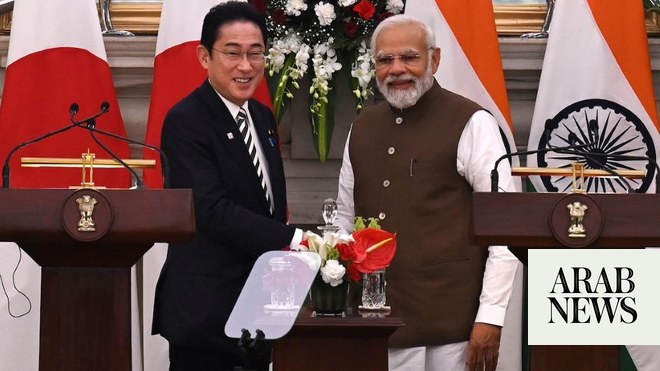
New Delhi, Tokyo hold respective presidencies of G20, G7 groupings this year
India ‘indispensable partner’ to achieve Japan’s vision of free, open Indo-Pacific
NEW DELHI: Indian Prime Minister Narendra Modi and his Japanese counterpart Fumio Kishida met on Monday for wide-ranging bilateral talks and discussed ways to strengthen cooperation for peace in the Indo-Pacific region.
Kishida, who is on a two-day trip to India and this year chairs the Group of Seven industrialized nations, invited Modi to participate in the G7 Summit in May, which will be held in the western Japanese city of Hiroshima.
The two PMs addressed issues ranging from security to climate and energy during their meeting and discussed ways to converge priorities of India’s presidency of the Group of 20 biggest economies and Japan’s G7 leadership.
“The India-Japan special strategic and global partnership is based on our shared democratic values and international rule of law. To strengthen this cooperation is important not only for both countries but also this will enhance peace and prosperity in the Indo-Pacific region,” Modi said.
“One of the pillars of the G20 presidency is to give voice to the global south. We believe in carrying everyone together,” he added.
Modi said Kishida’s visit was important “to keep the momentum going” for India-Japan cooperation.
The Japanese premier noted that India was an “indispensable partner” to achieve its new plan of a free and open Indo-Pacific, as he pledged $75 billion to the region as part of the expansive new vision.
“I believe that Japan and India are in an extremely unique position in the current international relations and furthermore in the history of the world,” Kishida said at a lecture hosted by the Indian Council of World Affairs.
“Japan and India have a great responsibility for maintaining and strengthening a free and open international order based on the rule of law.”
The two nations, along with the US and Australia, make up the Indo-Pacific alliance known as the Quad that has sought to counter China’s rising influence in Asia.
“This year, as Japan holds the G7 presidency and India holds the G20 presidency, my hope is that through working together with ASEAN (Association of Southeast Asian Nations) and other many countries we will bring about peace and prosperity to the international community which faces a time of challenges.”
India is not a G7 member but has been participating at its summits as a partner country. Japan, on the other hand, is a member of the two major groupings.
The two Asian nations are strong economic partners with bilateral trade valued at around $20.6 billion in the fiscal year 2021 to 2022. Japan has been supporting infrastructure development in India, which includes a high-speed rail project, and Tokyo’s investment in the South Asian nation reached $32 billion between 2000 and 2019.
Harsh V. Pant, head of strategic studies at the New Delhi-based Observer Research Foundation, told Arab News that both countries were increasingly looking at the Indo-Pacific through similar lenses.
“Though the two nations are on different tracks when it comes to the Ukraine crisis, certainly both feel the G7 and G20 have to work together if the global governance agenda is to be changed,” Pant said.
India has not condemned Russia’s invasion of Ukraine, while Japan has imposed financial sanctions to isolate Russia.
“India is pivotal to Japan’s Indo-Pacific outlook and strategy,” he said.
“Japan wants G7 and India wants G20 to work for the developing world, to resolve global governance problems and to ensure that the leadership void that the world is feeling at the moment is filled with the leadership of countries like India and Japan.”












